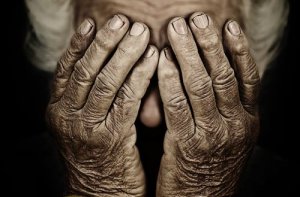Fear of Growing Old

Woody Allen, with his usual humor and intelligence, said: “Life is a sexually transmitted disease and the mortality rate is one hundred percent.” That quote gives us a very real idea of what it means to grow old and how unnatural it is to fight against the passage of time and the fear of growing old.
In recent years, there has been a wide spread of plastic surgeries with which people attempt to hide wrinkles. But what if we accepted ourselves as we are and enjoyed the moment instead of thinking so much about how we look?
Obviously we have to take care of ourselves, eat healthy, and exercise, but we have seen actors and actresses change their faces so much to avoid growing old that they look like another person. They have completely lost their identity. Why are we so afraid of growing old?
“Nothing makes us grow old faster than constantly thinking about growing old.”
-Georg Christoph Lichtenberg-
There comes a time when we walk down the street and a teenager asks us something, calling us “sir” or “ma’am.” In a second, everything changes, because we are aware of the passage of time. We are no longer the young people we thought we were, despite keeping our young spirit intact.
Gerascophobia: the fear of growing old
A phobia is an irrational fear that can end up affecting our quality of life and causing significant symptoms of anxiety. People who suffer from gerascophobia are afraid of growing old and they live in fear of the damage they are suffering due to the passage of time.
This happens because in many cases, old age is associated with negative aspects like diseases, the loss of mobility, a change in appearance, and wrinkles on our faces, and in general, the decline of our health.

Gerascophobia often starts developing around the age of thirty, when signs of time’s passage start to appear. In some cases, this can end up causing a certain anxiety. We can consider various causes of this irrational fear of growing old, such as only associating old age with negative aspects, forgetting what we have learned and the wisdom that we gain with time.
Another cause of this fear can be the image that the media gives us or the value that our culture places on youth. And one of the most important causes may be the fear of being alone and defenseless during the final years of our lives.
Reasons not to be afraid of the passage of time
There is no doubt that the passage of time lends us experience and knowledge that cannot be acquired in any other way. We are talking about the positive elements that deserve to be acknowledged for the great value that they have and which are precisely what we must value as we get older.
Below, we are going to give you some reasons not to be afraid of the passage of time so we can see the good side of that golden age.
The value of wisdom
As we get older, we acquire experience and skills that allow us to deal with life’s highs and lows differently. The wisdom that we gather over time allows us to make decisions, take on fears, and remain calm in the face of complicated situations.
“Cowardice ages us more than time; years only wrinkle the skin, but fear shrinks the soul.”
-Facundo Cabral-
Knowing who you are
With the experience that we acquire throughout our lives, we learn who we are, and how manage our faults and our virtues. We learn to be more authentic because we leave behind the fear of what others might say or think. Knowing oneself deeply is one of the most complicated tasks that we will face, but it is also one of the most gratifying.

Feeling comfortable
When we are young, we care a lot about our appearance, what we say, and what we do. But with the passage of time, we learn to love and value ourselves, to live in peace with ourselves. Our self-esteem becomes solid and we have a profound respect for ourselves, so we end up feeling comfortable.
“Knowing oneself is the greatest wisdom there is.”
-Galileo Galilei-
This text is provided for informational purposes only and does not replace consultation with a professional. If in doubt, consult your specialist.








